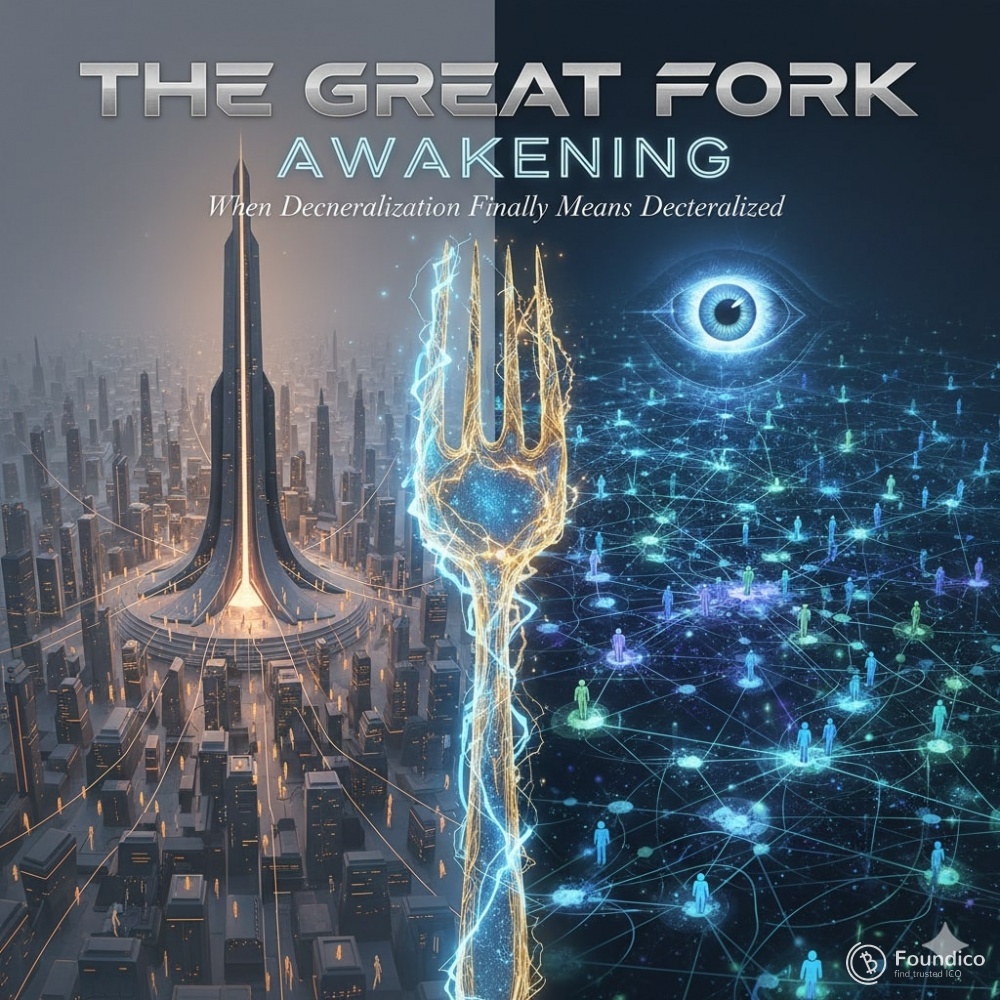The Great Fork Awakening: When Decentralization Finally Means Decentralized

By Dr. Pooyan Ghamari, Swiss Economist and Visionary
The concept of decentralization has become the mantra of the digital age, a promise of distributed power, freedom from centralized control, and a new era of trustless systems. Yet, for all the excitement surrounding blockchain technology, cryptocurrencies, and Web3, the reality often falls short of the ideal. We find ourselves at a critical juncture—a Great Fork—where the initial vision of true decentralization is set to diverge sharply from the illusion of decentralization that currently prevails.
The Illusion of Decentralization
Today, many "decentralized" applications, or dApps, exhibit troubling concentrations of power. Control often coalesces around a few large token holders, powerful development teams, or centralized hosting services. The infrastructure supporting these systems—from node providers to exchanges—is frequently managed by a small number of entities, reintroducing the very single points of failure we sought to eliminate.
This centralization creates a paradox: a system designed to resist capture is, in practice, being quietly co-opted. The spirit of the original white papers—a truly permissionless, censorship-resistant, and equitable network—is being eroded by market dynamics and human nature, which naturally gravitate towards efficiency and aggregation of resources.
The Great Fork: A Necessary Schism
The Great Fork represents a necessary and fundamental schism in the trajectory of the digital economy. It is the moment when the market and community will decide, once and for all, whether to commit to the hard path of genuine decentralization or the easy path of centralized efficiency.
This awakening will be driven by several key developments:
1. Infrastructure Disaggregation
True decentralization must extend beyond the ledger itself and into the physical and digital infrastructure. This involves moving away from relying on a handful of cloud providers (like AWS) and embracing truly distributed networking, peer-to-peer storage, and the widespread adoption of home or community-run nodes. The Great Fork will demand an economic model that adequately compensates individuals for contributing to the core infrastructure, ensuring it remains distributed and resilient.
2. Decentralizing Governance and the 'Fat Client'
Many systems suffer from what can be called the "Fat Client Problem"—where core governance and development heavily influence the protocol's direction, effectively acting as an oligarchy. The Fork requires the maturation of governance mechanisms that are truly representative and non-manipulable. Furthermore, decentralization of the actual protocol code and its execution—making it simple and cost-effective for anyone to run a full, validating node—is non-negotiable. Only when the cost of validating the chain is negligible can we ensure a diverse set of participants, which is the ultimate firewall against capture.
3. Shifting from Capital Concentration to Stake Distribution
The current model often grants disproportionate power to those with the deepest pockets—the "whale problem." The Great Fork will necessitate innovative economic mechanisms, perhaps involving quadratic voting or other proof-of-contribution models, that prioritize the distribution of participation over the concentration of capital. Decentralization is an exercise in equitable power distribution, not just asset ownership.
The Vision of True Awakening
The true awakening—when decentralization finally means decentralized—will result in systems that are fundamentally more robust and trustworthy. They will be antifragile, thriving on disruption because no single entity can be targeted. This is not merely a technological challenge; it is an economic and philosophical one.
The Swiss tradition, valuing sovereignty, distributed governance, and neutrality, offers a historical parallel. Just as Swiss cantons maintain a strong degree of autonomy while contributing to a stable federation, truly decentralized networks must empower the individual participants while maintaining a robust protocol layer.
The Great Fork will not be a seamless upgrade. It will be characterized by difficult decisions, market volatility, and a rejection of the convenience offered by centralized intermediaries. But it is an essential step toward realizing the profound societal change promised by these technologies: a digital economy where power is inherently diffused, creating a more secure, equitable, and ultimately visionary future. The time for the Awakening is now.
